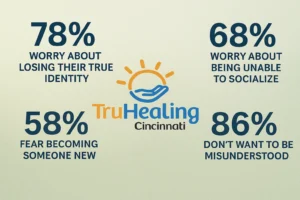If you’re newly sober, you might feel like you’re in emotional freefall. Maybe everything around you is quiet for the first time in a long time—and it’s not peaceful, it’s deafening. Maybe you’re scrolling this page at 2 a.m. wondering if going to treatment will make you lose the only parts of yourself you still like.
I remember that ache. The loneliness that isn’t about being alone—it’s about feeling like no one knows what it’s like to live in your skin right now. And if the idea of checking into a residential treatment program makes your stomach drop because you’re thinking, Will I even recognize myself anymore?—I want to say this:
That fear is real. But it’s not the full story.
Below are the questions I asked myself when I was new. Some I whispered to friends. Some I didn’t say out loud for weeks. If you’re reading this, I want you to have honest answers—not just the polished ones.
Will I lose my identity in treatment?
No. You’ll actually start to uncover it.
Addiction is a shape-shifter. It blends into your personality. You get so used to surviving that you forget what thriving ever felt like. When you enter treatment, you might feel stripped bare—but what’s underneath isn’t empty. It’s you. The real you.
Not the version of you who has to be “on” all the time. Not the one who cracks jokes to cover pain. The version who can breathe without performing. The one who can feel things—good, bad, weird—and not drown in them.
You don’t lose yourself in treatment. You find out who’s been waiting under the noise.
What if I’ve used substances to feel social, funny, creative—will that part of me disappear?
This one is tough because for a lot of us, substances weren’t just an escape. They were a shortcut to connection. Confidence. Belonging. So of course it’s terrifying to imagine what’s left when you take that away.
But the truth is, what’s underneath isn’t nothing. It’s just been quiet. Maybe scared.
Sobriety doesn’t flatten you. It frees up space. Your sense of humor, your fire, your ability to connect—that stuff wasn’t born in a bottle. It lived in you already. Treatment helps you learn how to access it without burning your life down to feel alive.
It’s like switching from using gasoline to keep a candle lit—to realizing you’ve always had a steady flame inside. You just forgot how to protect it.
Will I still get to be me in a residential treatment program?
Yes, with all your layers.
At a program like TruHealing Cincinnati, they don’t expect you to show up as some textbook version of recovery. They expect you to be a human person figuring it out. You’ll be invited to talk, reflect, cry, laugh, rest. You’ll also have bad days, quiet days, even “I hate this” days. That’s all part of it.
Your job isn’t to become some perfect version of yourself. It’s to stop running from the parts you’ve spent years numbing. That’s brave. That’s being you—maybe for the first time in a long time.
What happens if I don’t want to share everything with everyone?
You don’t have to.
You’re not a project. You’re not a confessional booth. And you’re not there to bleed out your whole story to prove you belong.
At TruHealing Cincinnati, group therapy, one-on-ones, and community spaces are offered with care—but they don’t push you past what you’re ready for. It’s okay to be quiet. It’s okay to hold something back. Healing has a pace. And yours is valid.
Sometimes the first breakthrough is just saying, “I’m not ready to talk about that yet.” And having someone say, “Okay.”

What if I feel lonely even in a room full of people?
Then you’re probably still healing—and you’re not alone in that.
The loneliness that comes with early sobriety is sharp. It’s not because you’re broken. It’s because substances created artificial closeness, and now everything feels distant. That’s normal.
In a residential treatment program in Cincinnati, you’ll be surrounded by others going through different versions of that same ache. And while it might not go away immediately, something shifts when you see someone else nod while you talk. When you hear someone say the thing you thought only lived in your head.
Loneliness doesn’t disappear overnight. But it gets lighter when you stop carrying it alone.
Can I still joke around? Be weird? Make fun of stuff?
Yes. And honestly? You should.
Humor is part of recovery. It helps you breathe when the feelings are too big to name. At TruHealing Cincinnati, people are allowed to laugh, curse, be ridiculous, and yes—roll their eyes when the therapist pulls out a metaphor that’s a little too on-the-nose.
Being yourself doesn’t mean being serious all the time. It means being honest. And sometimes honesty sounds like sarcasm, or feels like belly laughter during snack time.
Your full humanity is welcome. Not just the “healing parts.” All of it.
What about the people there—what if I don’t relate?
You might not at first. That’s okay. But chances are, someone will surprise you.
You’ll hear a story that hits home. You’ll share a glance across the room when someone else cries and realize they’re feeling what you couldn’t say. You’ll see someone having a hard time and want to hand them a tissue—or have someone hand one to you without a word.
These micro-moments are where connection begins. Whether you’re from Cincinnati or looking for a residential treatment program in Lexington, Kentucky, the people you meet in treatment might become your lifeline—or your mirror.
You don’t have to relate to everyone. But you will likely find your “weird little corner” of people who get it.
What if I relapse later—does that mean treatment didn’t work?
No. It means you’re human. And the truth is, many people relapse. Not because they failed—but because healing isn’t linear.
What treatment gives you is a map. A community. A set of tools you can return to. A voice inside that says, “You deserve another chance.”
The version of you that walks out of treatment is not bulletproof. But they’re no longer walking unarmed.
And if you ever find yourself needing help again, TruHealing Cincinnati’s doors are still open. That matters.
Will I have to let go of everything from my “old life”?
Only the parts that were hurting you.
That friend who only calls when they’re using? Yeah, they might fall away. That bar you used to escape to? It might not be safe for a while. But not everything gets cut. Some things get redefined. Some get returned to later, when you’re stronger. Some surprise you by sticking around in new, better ways.
Recovery doesn’t mean losing your whole identity. It means learning to live without things that were slowly killing you—so you can protect the parts of you that were always worth keeping.
Final Thoughts: You Don’t Need to Erase Yourself to Heal
A residential treatment program isn’t a factory where they strip you down and rebuild you into a recovery robot. It’s a space where you’re finally allowed to exhale.
To rest. To ask. To feel things you’ve been running from.
You don’t need to have it all figured out. You don’t need to show up as some brand-new person.
You just need to walk in—awkward, scared, messy, and real.
Call (888) 643-9118 or learn more about TruHealing Cincinnati’s residential treatment program. Whether you’re local or looking for a residential treatment program in Lawrenceburg, Kentucky, help isn’t far.
You don’t have to disappear to get better. You just have to come home to yourself.


